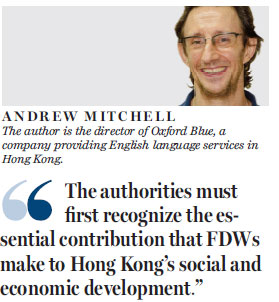HK's domestic helpers need shelter from the cold weather
Updated: 2016-02-04 08:17
By Andrew mitchell(HK Edition)
|
|||||||||
As the mercury dropped to almost unprecedented levels at the end of January, it was hard not to spare a thought for the crowds of foreign domestic workers (FDWs) huddled together in parks and on footbridges throughout the city as they tried valiantly to enjoy their day off in spite of the freezing cold.
FDWs perform an essential task in Hong Kong: looking after our children and taking care of our elderly while we go out to work. And while their work is often taken for granted, it should be remembered that without it many local women would, quite simply, be unable to devote themselves fully to their chosen careers.
And yet, all too often FDWs are treated like second-class citizens here. Denied a minimum wage comparable to that of local employees, they are also potentially at the mercy of not only abusive bosses but exploitative agencies. Moreover, since they are required by law to live with their employers, they effectively have nowhere to go on their one day off a week. And while that might not seem such a hardship most of the year round, it certainly is when winter descends.
There are, of course, several charities offering support to FDWs in Hong Kong. Christian Action, for example, runs a training center dedicated to domestic helpers, with classes in IT, English and financial literacy. They also provide two safe houses for helpers seeking justice from abusive employers. However, there is no way that they - or any other charity, for that matter - can step in to provide facilities for up to 400,000 FDWs to use on their days off.
This is clearly an issue where genuinely principled and public-spirited politicians should intervene. But although the problem stretches back well into the colonial era, nothing substantive has been done up until now. Politicians of all stripes, it seems, feel that they have little to gain and much to lose from helping a group of disenfranchised foreign workers.
In the absence of any commitment on the part of local politicians, then, it is up to the government to step in and solve the problem. Now, obviously this is easier said than done. After all, space is at a premium in Hong Kong and our existing community halls and centers are inevitably booked up at the weekend already. However it seems to me that, with a little imagination and a bit of resolve, the authorities could find a workable solution.
One idea that springs to mind here is to arrange for government and aided schools to open their gates to FDWs on Sundays. Schools are, of course, located throughout the SAR, and would therefore be easily accessible to all FDWs. Moreover the presence of FDWs on school premises would provide school authorities with an ideal opportunity for "nurturing social competence" among their students, thereby fulfilling one of the "basic beliefs" of Personal, Social and Humanities Education, one of the seven Key Learning Areas of the local curriculum. By enabling students to participate in programs organized for the FDWs, the authorities would be able to achieve the goal of "strengthening the linkage between classroom learning and social reality", to quote the Education Bureau. It would also be able to provide opportunities for students to "observe and experience social dynamics".
The government could also look beyond existing schools for the provision of facilities for FDWs. For example, to remain within the domain of education, it could consider making newly decommissioned school buildings available to FDWs at the weekend. To take this further, perhaps some interest classes could be organized for the FDWs - such as Cantonese lessons.
According to last year's audit report there are more than 100 vacant school premises that are currently empty. By making these premises available to FDWs at the weekend, the government would not only be providing much-needed assistance to the FDWs; it would also be helping to prevent the premises from falling into disrepair.
Clearly both these ideas are tentative ones. But if nothing else, they serve to prove that potential solutions are at hand here. What is required first and foremost, then, is not so much a ready-made solution as a commitment on the part of the government that the problem can and should be solved.
To make this commitment, the authorities must first recognize the essential contribution that FDWs make to Hong Kong's social and economic development. They must also recognize that if Hong Kong truly wants to be "Asia's World City", it has to take care of the basic needs of FDWs. And what need could be more basic, in the final analysis, than shelter from the cold?

(HK Edition 02/04/2016 page9)